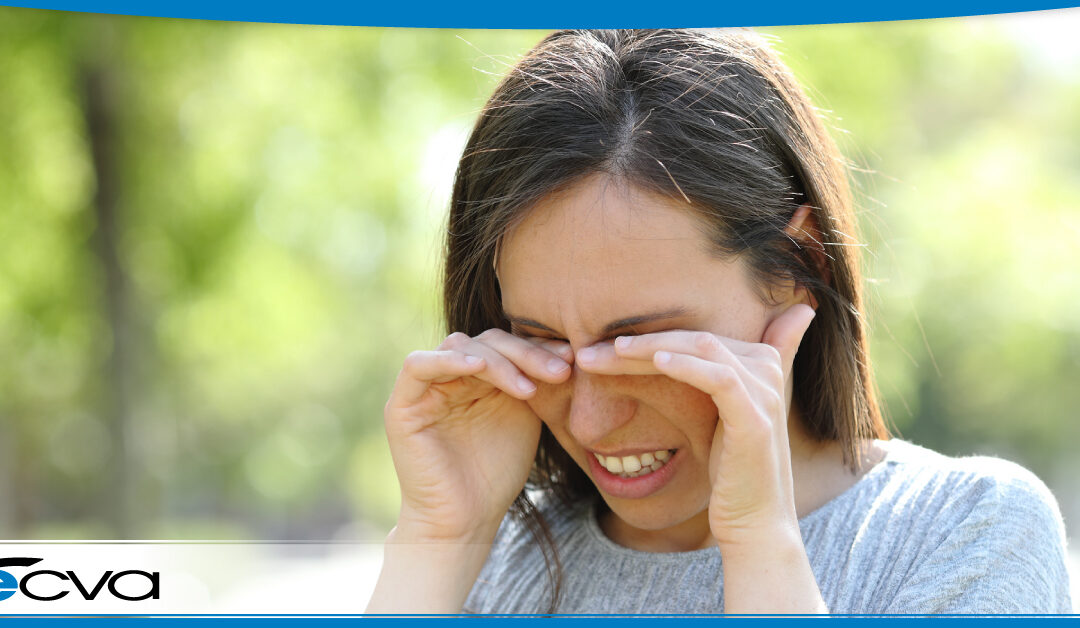Even when you are in a great mood, your eyes are covered in tears. That helpful fluid keeps your eyes comfortable and healthy, providing water for moisture, oils for lubrication, and even antibodies that battle potential infections.
When your eyes are dry, it usually means that you don’t have enough tears to keep your eyes at their best. But why you’re struggling with dry eyes can vary. Anything from a health condition to lifestyle choices can be responsible. If you are wondering why your eyes are so dry, here’s what you need to know.
Dry Eye Symptoms
If you have dry eyes, you may experience a number of symptoms. It may feel like there’s grit or an eyelash in your eye. You may have some itching or stinging. Eye redness or fatigue can occur, and you may see some stringy mucus. In some cases, your vision may even get blurry, and you might become sensitive to light.
When the level of tears falls low enough, your eyes might start overproducing tears, leading to watery eyes. It’s a condition caused reflex tearing, where your nervous system tries to compensate for the lack of lubrication by over-moisturizing your eyes.
Causes of Dry Eye
While dry eyes are almost universally a signal that there aren’t enough tears to keep your eyes comfortable and healthy, the reason for the lack of tears can vary. Usually, tear production decreases naturally as a person ages, particularly for women who enter menopause.
Certain medications can be dehydrating and may lead to dry eye. Additionally, numerous health conditions can reduce tear production, including collagen vascular diseases, some autoimmune conditions, diabetes, and thyroid disorders.
A vitamin A deficiency may lead to dry eyes. Additionally, anyone who’s had tear gland damage may not produce enough tears, and people with eyelid problems may struggle to keep their eyes lubricated.
Lifestyle can also play a role. Wind and smoke can dry out the eyes. If you spend a lot of time driving, reading, on a computer, or using a smartphone, you may blink less, causing tears to evaporate more quickly or not be spread across the eye as often as needed.
Effective Dry Eye Treatments
Since there are numerous potential causes of dry eye, it’s always best to speak with a doctor. That way, they can determine if an underlying health condition may be responsible and that you receive proper treatment.
In most cases, dry eye symptoms can be relieved by using artificial tears (eye drops) or ointment. Many over the counter options can make your eyes more comfortable, though you may need to try a few to see which one works best for you. There are also prescription versions if your doctor thinks those are a better option.
If your case is severe, your doctor may recommend other treatments. For example, punctal occlusion – a process where the duct that allows tears to drain is plugged, either temporarily or permanently, to keep tears in your eye longer – may be appropriate in some situations. Lipiflow, where a device is used to unclog blocked eyelid tear glands, might also be recommended by a physician if a lack of oil is causing your dry eye.
At times, dietary changes, such as increasing the amount of omega-3 in your diet, may provide relief. Topical testosterone creams or steroid drops might also be on the table.
If you are struggling with dry eyes and you haven’t addressed it with a doctor, it’s time for a visit to your ophthalmologist or optometrist. Schedule an appointment at your nearest ECVA clinic today. Our skilled team will work diligently to determine the cause of your dry eyes and protect your health. We’ll create a customized treatment plan based on your unique needs, whatever they may be.



